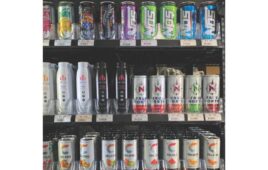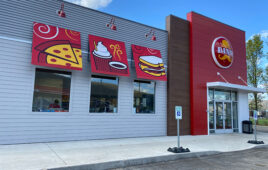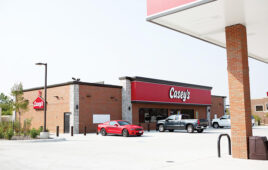 Whether it’s for a made-to-order sandwich, pound of potato salad or full ready-to-eat meal, consumers are increasingly turning to delis for freshly-prepared foods. Retailers explain how they have turned their delis into destinations.
Whether it’s for a made-to-order sandwich, pound of potato salad or full ready-to-eat meal, consumers are increasingly turning to delis for freshly-prepared foods. Retailers explain how they have turned their delis into destinations.
By Marilyn Odesser-Torpey, Assistant Editor
Delis are increasingly becoming consumers’ destinations of choice for fresh, premade meals, said a new report from Nielsen Perishables Group. Average deli dollar sales per store per week grew by 5.4% during the 52 weeks ending April 30, 2016. Nielsen credited deli-prepared foods for leading the growth with a 6.7% rise in dollar sales.
“Best-in-class fresh retailers prioritize the deli, as innovation in the space can truly differentiate a retailer from the competition, making the deli an in-store destination for consumers and a sales growth engine for the store,” said Sarah Schmansky, director of the Nielsen Perishables Group.
Convenience stores are in a prime position to deliver everything consumers could want from a deli, said Nancy Caldarola, general manager of The Food Training Group, which is based in Roswell, Ga. Consumers are looking for speed and convenience, and those are givens in convenience stores,” she said.
They are also increasingly describing the foods they want as made with ‘clean’ ingredients—as free as possible from processed ingredients and chemicals—a term that seems to mean even more to them than the traditional “healthy” and “fresh.” (If you do buy processed foods, she said, make sure you get the best you can find.)
Let customers know as much as possible about the food, she said. Transparency, she explained, breeds trust.
“Deli is a big deal and customer satisfaction levels are growing as they are seeing more value for their dollar,” Caldarola said. “People are learning that they can come to a convenience store and get great food.”
Diversity of product is important to consumers, especially Millennials. On the flavor front, convenience stores can use different seasonings and sauces to create a wide variety of flavor profiles without adding a lot of extra inventory, she said. Caldarola emphasized that retailers should keep up with food trends to make sure they are offering the most current products and flavor profiles.
When it comes to convenience, Sheetz allows customers to order online and pick up their food, she said. At Wawa, they can order from a kiosk.
“By offering what customers want and using the appropriate technologies, convenience stores can hit it out of the ballpark,” she said. “The mistake some convenience stores make is not being willing to put money into the deli to stay competitive. That includes providing easy ways to order and pay (for example, Apple Pay).”
BOLLA PUNCH
Harry Singh, president and CEO of Bolla Management, which operates 65 stores on Long Island and in New York City and New Jersey, described his company’s deli program as a “one-of-a-kind convenience store food offering.”
Of the 36 branded Bolla Market stores, 16 have delis, which serve Boar’s Head meats and feature a diverse menu of breakfast sandwiches, panini, salads and wraps as well as a hot buffet for lunch. On the buffet are items like chicken Marsala, salmon, tilapia, meat loaf and pasta dishes. All of the deli offerings are made fresh that day by trained chefs. Singh insists that no offering is ever frozen.
Bolla’s first deli was opened in Brooklyn in 2007. The typical size of a store is 2,000 to 5,000 square feet with 300 to 500 square feet dedicated to deli.
“Customers want fresh, fast and high quality,” Singh said. “We offer this and more; we make it a true experience.”
Singh explained that Bolla focuses on the deli as a key competitive differentiator. The company “aggressively” uses external point-of-purchase signage to drive traffic from the pumps into the stores. Inside, there are attractive photos of the food available at the deli. Monthly mailers to specific zones surrounding the store sites also keep the deli top of mind in the community.
The deli allows the Bolla Markets to offer catering which, in addition to online ordering, Singh said he views as major growth opportunities for the company. Bolla is also exploring the possibility of opening a stand-alone concept that would feature food as the primary offering.
DRESSED TO ORDER
In Ashland, Ky., Jack’s South Ashland Deli has been a landmark brand since 1979. When owner Jack Stephens sold his 5,000-square-foot store to Clark’s Pump-N-Shop in 2014, he came along with it. So did the Jack’s South Ashland Deli name, which Clark’s adopted to brand its in-store deli.
The 300-square-foot deli department includes a 12-foot meat case, offering a wide array of barbecue and bulk salads, the c-store’s specialty. Chicken salad made from Jack’s original recipe is the signature item here and the store sells about 100 pounds of it each day, said Brian Unrue, Clark’s director of operations.
Twenty-five types of pasta salads are available at the deli. Seven types of breads are brought in from an Amish bakery twice a week.
Sandwiches, according to Unrue, are “dressed to order,” with the meat cut right in front of the customers and many additional ingredients available for them to customize. The store also has a drive-through window.
In addition to the Ashland store, the deli prepares sandwiches and salads for eight other Clark’s locations. The company has 63 stores in Kentucky, Ohio, West Virginia and Florida.
Clark’s is opening a second Jack’s South Ashland Deli in its new store in Georgetown, Ky., located off a major exit of a heavily traveled highway.
“Foodservice is one of the two areas—technology is the other—in which we have invested, and we’re seeing a tremendous growth in sales both in the food itself as well as in incremental items such as chips and pop,” Unrue said.
DELI DELUXE
It’s been a little less than a year since Englefield Inc. launched a made-to-order sandwich prototype in one of its Duchess Shoppes convenience stores. And customer reaction has been so positive that the company is planning to go forward with more of them, said Judy Dudte, director of food service for Englefield Inc.
The new store was designed with a full kitchen that is used for preparing food offerings.
In the rest of the company’s 122 locations in Ohio and West Virginia, sandwiches are made in-house and sold from grab-and-go cases. One hundred of the c-stores have four-foot or six-foot deli cases that customers can access. Food is prepped in the back on six-foot tables, some of which are refrigerated.
“Our freshly-made sandwiches are a draw in our deli stores,” Dudte said. “Our customers are more interested in quality than price, so we have changed up a lot of our meats, cheeses and buns to give them the upscale products they want.”
Traditional varieties such as turkey and cheese, ham and cheese, egg salad and chicken salad are among the top sellers in the stores. Another favorite is the signature Duchess Sub, a proprietary sandwich that comes with a thick combination of meats and cheeses.
To promote its popular sandwiches, Duchess Shoppes display signage both outside and inside the convenience stores. A colorful sandwich photo is also wrapped around the company’s gas tanker truck. Awareness of the new made-to-order sandwiches is being promoted with inserts in the local newspapers, direct mail and billboards.




